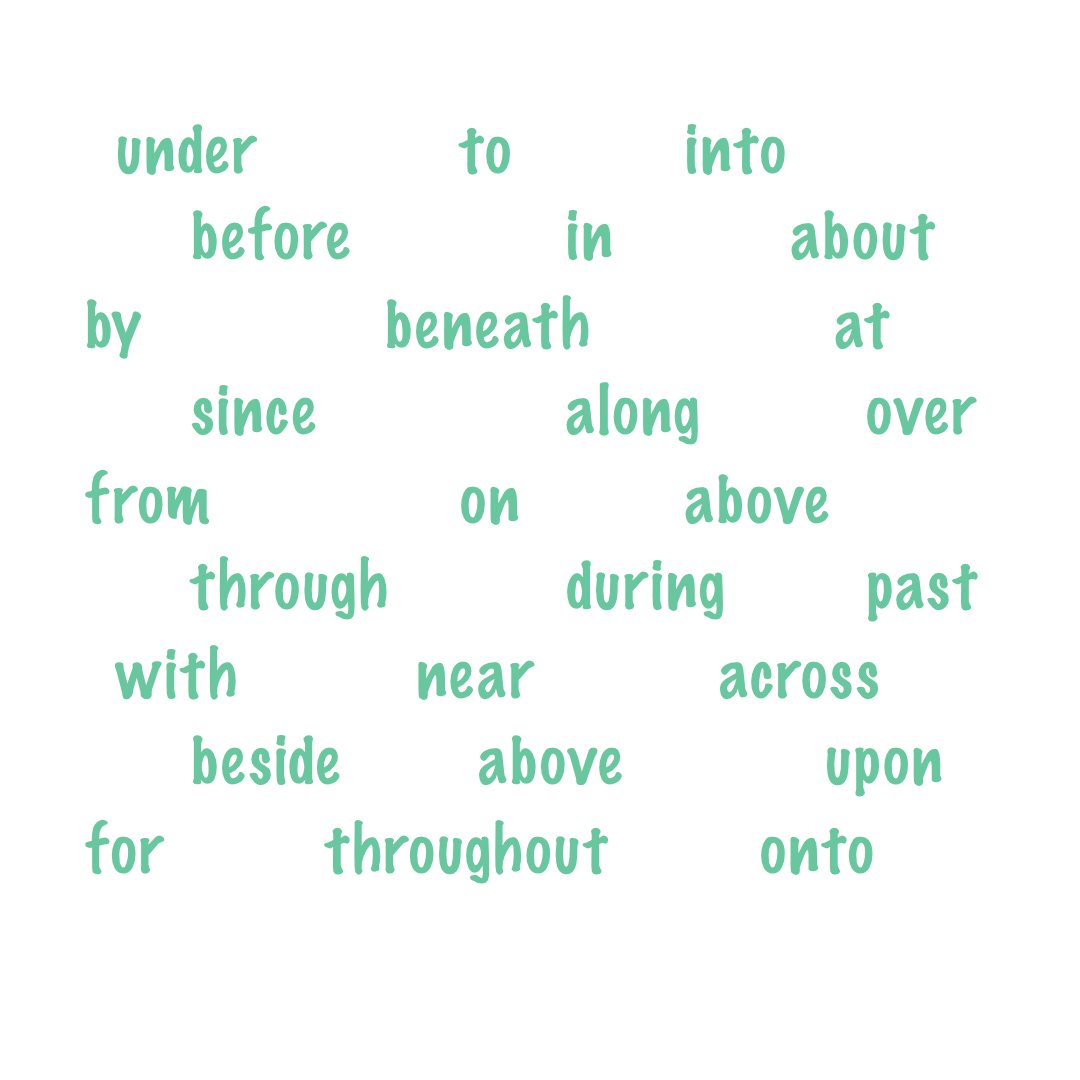Problems with Prepositions
What are prepositions?
Prepositions are very useful and important little connecting words which show the relationships between words in a sentence. They often follow verbs, adjectives and adverbs.
Without prepositions we would have lists of words which communicate very little.
An example: The mirror is the cabinet.
As it stands, this sentence doesn’t make sense because a mirror is not a cabinet.
We don’t know whether there is a relationship between the mirror and the cabinet, let alone what that relationship might be.
We need a preposition to link the mirror to the cabinet. There are many choices so, unless we have the correct preposition, communication of the speaker or writer’s intent will remain unclear.
Let’s look at some possibilities:

All make sense and all show relationships between the mirror and the cabinet – but which one did the writer mean and what did the writer wish to communicate?
It is important, then, to be precise – by using the correct preposition. Only then can one communication effectively.
How can we know which preposition to use?
Many teachers and writers of language texts say there is no easy way to know which preposition to use but that is not entirely true. If you think about the concept involved it’s often possible to work out the appropriate preposition.
Accordingly, The Language Place has compiled this list of some of the most frequently asked questions and the most occurring problems with prepositions – with a guide to how they should be used correctly. Don’t worry: you don’t need to learn them off by heart: if you think about and understand the reasons for their use, it’ll become easy!
Which preposition follows different?
No other question needs more attention than this one. Just listen to native speakers, even respected journalists as they get it wrong.
So, which is correct – different from, different to or different than?
The only correct answer is from.
The reason: movement to a point (being identical) and movement away from that point
Think of two objects: A and B
Imagine these two objects moving gradually towards each other, step by step, becoming more similar to each other as they add ‘matching items’.
A → ← B
When they meet each other they are identical to each other.
Now imagine the same two objects moving away from each other, removing ‘matching items’ as they go and gradually becoming more and more different from each other.
← A B →
So, there we have it: identical to, similar to
BUT different from, separate from
Similarly, dislocated from – not to. Again there is this sense of turning away.
When it comes to hostility: being against
A prejudiced person is against certain people. There is a sense of hostility and turning away, not a sense of turning to someone.
The same is true of retaliation against – not to. When you retaliate, you turn against something; you do not turn to it.
Similarly, threats against – not towards. Again there is this sense of hostility.
Another example: There were reports of racist chants directed against – not towards black players.
If it’s about hostility, the preposition is more likely to be against than to or for.
But beware this trap: You can be opposed to something but you are an opponent of it.
Is it based on or based off – or based off of?
The answer is based on – and the reason is quite straightforward if you think about it.
If a structure has a base, that base is the foundation and whatever is added sits on it.
You can see, then, why based off cannot possibly be correct.
As for based off of, why? We don’t ever need two prepositions as one will always do the job, so based off of merely compounds the error.
And, of course: outside the home – not outside of the home
inside the box – not inside of
focused on – not around
This one is easy too. Think of focusing your camera’s lens. You want to focus it precisely on a subject not around it because you want the image to be clear and precise.
mired in – not by
Mire is mud. If you’re unfortunate to be stuck, you’re in the mud, not by it!
arrive at or in – not to
Another example which is not really so difficult. When you arrive you have completed your journey. Perhaps you are at home or in Paris but you are certainly not still travelling to anywhere.
At and in are prepositions which express a static condition.
To is a preposition which expresses movement. It is used with verbs of motion such as travel, go, drive etc.
Consider also:
In and Into
On and Onto
In and on are static; into and onto imply movement.
In a similar way, you can find yourself in trouble, but you get into trouble.
You step into a car but you sit in it.
My best friend used to get into trouble for chewing gum at school. He was always in trouble.
I stepped carefully onto the ice. I stayed on the ice until the skating session ended.
And some more …
charged WITH a crime – not for
convicted OF a crime – not for
He pleaded guilty TO murder – not over This is a legal formula.
He was guilty OF murder – not over or to Here guilty is an adjective describing ‘He’.
charged WITH murder – not charged for
excited ABOUT or BY – not excited for
defiance OF the law not to or against
angry ABOUT – not angry from
offended BY – not at
take offence AT – not to
plead WITH someone – not to someone
but plead your innocence
poke fun AT
make fun OF
within walking distance OF
enamoured OF – not by or with
enjoyment OF – not for
attacks ON enemy bases – not to
preference FOR – not towards
forbidden TO smoke – not forbidden from smoking
forbidden BY his parents TO smoke
defeat BY a worthy opponent- not to
OF one’s own free will – not under
OF her own volition – not on
in response TO – not for
within easy reach OF
within walking distance OF – not to
retaliation AGAINST – not to
accompanied BY – not with
tolerant/tolerance OF – not for
intention TO or OF – not on
proximity TO – not with
well suited TO – not for
brother OF – not to
discrimination AGAINST – not of
bored WITH/BY – not of
fed up WITH – not of
BETWEEN here AND there – not to
destroyed BY it – not from it
optimistic ABOUT – not of
assisting police WITH their enquiries
lob missiles ON the enemy base
communicate WITH – not to
assaulted BY – not from
stand up TO – not against
appalled BY – not at
an overhaul OF – not to
enamoured OF – not with
resentment OF – not towards
suffering FROM – not with
devastated BY – not in relation to or about
He is an advocate OF free transport for pensioners.
He advocates FOR free transport for pensioners.
tolerance OF – not for
astounded BY – not at
victims OF – not to
affinity WITH – not to
disillusionment WITH – not in
to have an interest IN – not for
bestow something ON or UPON somebody – not to
suspicious OF – not towards
aware OF – not about
Nestled IN the bushland – not amongst. Bushland can’t be counted.
but nestled AMONGST the trees – because trees can be counted
under arrest FOR murder
under arrest ON suspicion of murder
peddled TO – not at
estranged FROM – not with Again, the sense of away
prevent something FROM happening
glimpse OF – not at

